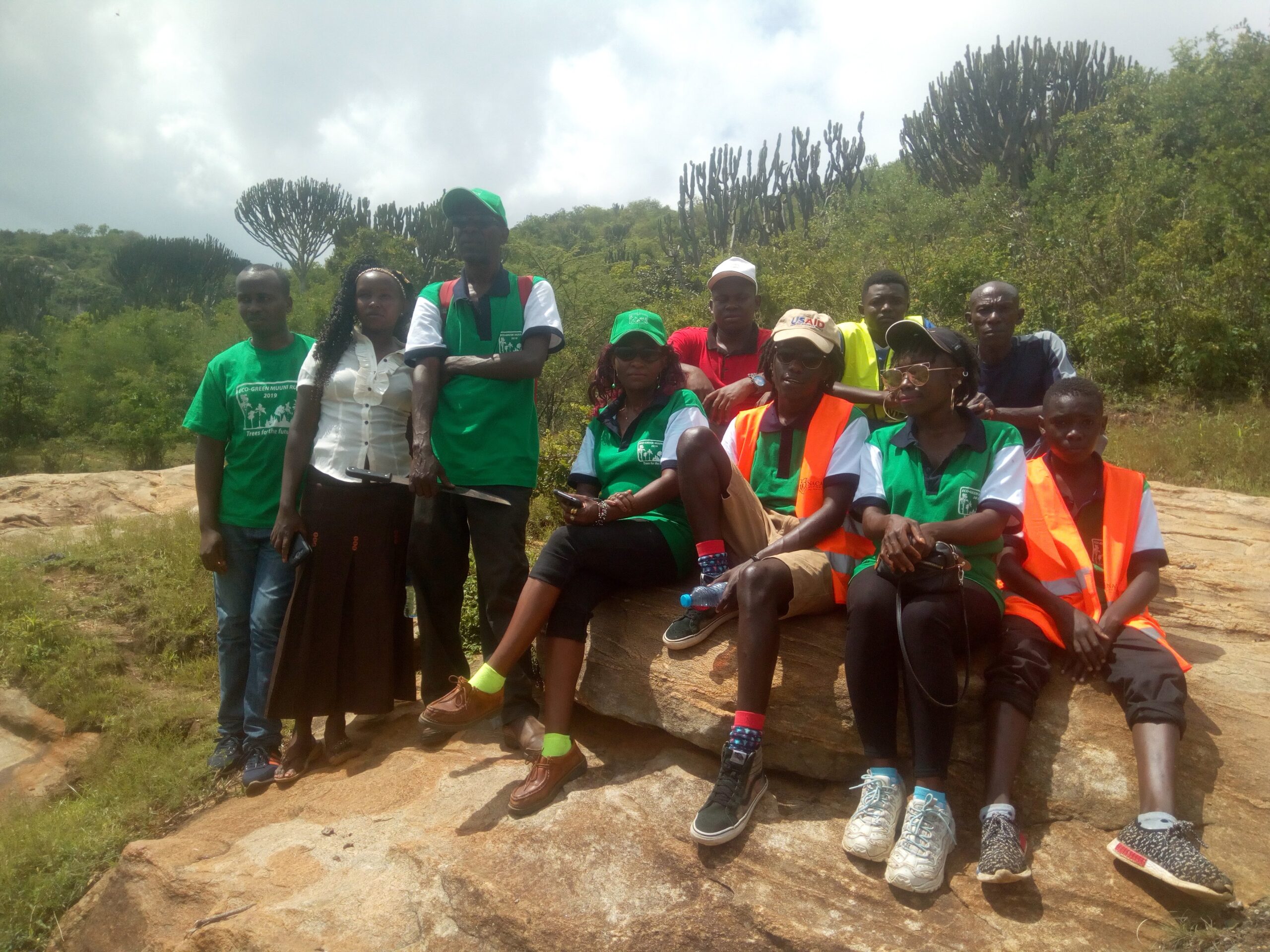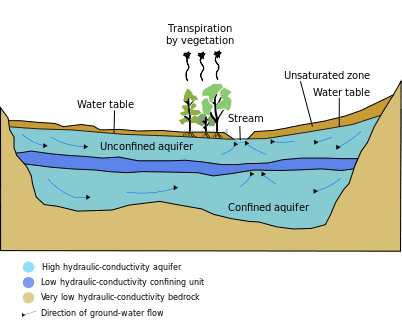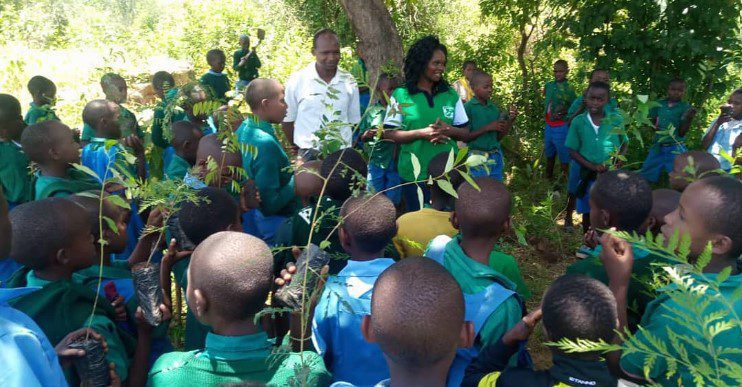
Project: Eco Green Initiative School based Environment Clubs (EGI E-Clubs).
Eco Green Initiative (EGI) School based Environment Clubs (EGI E-Clubs) are one among six other EGI strategy projects toward public environment awareness on climate change and mitigation. This program comprises issues that address health, water and sanitation, tree planting with particular emphasis to multipurpose trees and species especially medicinal and fruit trees. The strategy offers children a unique chance to learn about the importance of trees and provides an opportunity for effective student participation in environmental issues and local mitigation of impacts of climate change. We believe that EGI E-Clubs will spread environmental awareness to a diverse audience throughout our schools, homes and neighborhoods. Student members are guided by EGI with convenient, thoughtful and practical ways to change their lifestyles to better the environment, provide stewardship toward a sustainable natural environment, and take active role in exercising this responsibility.
While what we do today echoes into tomorrow, we are aware that our world is becoming more and more environmentally conscious and EGI wishes to instill such forward character in the early lives of our students and the community at large. We agree and know that together, we can and will create positive change.
Primary objective: Effective student participation at school and in neighborhood general environment conservation and preservation.
Rationale
Fruit Trees will enable children to enjoy healthy diets and to create a healthy eating culture within primary schools. To provide generations of Children and teachers with healthy nutrition options and environmental education opportunities in green and therefore good learning environments and compounds
Medicinal plants still provide the first line of treatment for hundreds of millions of people. Our community (Akamba) have historically dependent on trees for provision of medicines and pharmaceuticals. Today there is an increasing concern about the disappearance of medicinal and treatment plants. Ironically this is the period when the world is confronted with new diseases, viruses and bacteria for which there is no known cure, and old diseases that have grown resistant to conventional drugs.
Trees and forests play a crucial role in social economic development and are directly essential for sustaining livelihoods. Trees are also a necessary life-support in terms of ecosystem services that provide clean air, fresh water, fertile soils, stable climates and food. Trees are also used as animal feeds and as raw materials in construction of houses, carts, household utensils (e.g., baskets, etc.), and in traditional crafts such as carving. Plants, especially trees are also traded commercially as timber.
Many plant (and animal species that are depended on the trees) have spiritual significance on local culture and heritage, and indeed around the world. Some products of nature are used as sacred objects in religious rituals and festivals (e.g., music drums), while others are used as totemic symbols.
Tree aesthetics provide inspiration and provokes curiosity and imagination. For instance, artists, musicians and poets are often inspired by the diversity of life. Our lives would certainly be poorer if we lost even the smaller species such as beetles, frogs, ants, and lizards. Such Bio diversity requires trees and tree environments to survive
Education and science of the relationship and inter dependence of people and local flora and fauna is critical toward sustainable life support systems in the face of the accelerated extinction of species. The assurance of continued existence of trees is essential toward acquisition of this knowledge (you cannot study trees if they don’t exist).
CONSERVATION AND MANAGEMENT
Conservation is a deliberate effort to turn the tide of destruction caused by man into a new, positive relationship where man lives in harmony with the wild. National and County governments have developed measures that are designed to reduce the negative impacts on our environment and escalate conservation.
Eco Green Initiative has various approaches and mechanisms toward achieving results in conservation of tree resources and mitigation of climate change. They range from the establishment of an enabling environment and concrete conservation action on the ground either in-situ (at the site) or ex-situ (outside the original habitat of the species). Some of the common site conservation actions include designation of common public spaces, habitat restoration, surveys and monitoring. Other conservation related actions are capacity building, environmental education and awareness-raising on the importance of trees and the impacts and consequences of human action.
Conservation of environment is a collective responsibility and takes place at various levels, from global to local. Local communities participate in the implementation of site action to sustain, safeguard or increase tree and forest resources. Environmental Education can provide the knowledge, attitudes, motivations, commitment, and skills to work individually and collectively toward solutions of current problems and the prevention of new ones. One of the major approaches used to educate and create awareness among the youths in conservation is through the formation of Environment Clubs. Environment clubs are generally established in schools and communities, and have proven over the years to be an effective mechanism in stimulating interest and engaging youths in conservation. Environmental Education through EGI School based Environment Clubs is critical if these efforts are to be supported and sustained.
The activities of these clubs are directly or indirectly related to conservation.
EGI School based Environment Clubs
It has become clear that the degrading state of the environment is as a result of human activities. A growing interest among students and teachers in environmental issues and their conservation led to action in the form of EGI School based Environment Clubs. The Clubs are voluntary youth groups formed in schools and communities, dedicated to protecting the environment by supporting and promoting conservation action.
EGI Clubs are a mechanism for raising awareness and to increase interest and youth involvement in the environment and the conservation at school level. EGI Clubs also provide an opportunity for schools to implement environmental conservation education programs in Kenya’s CBC education system.
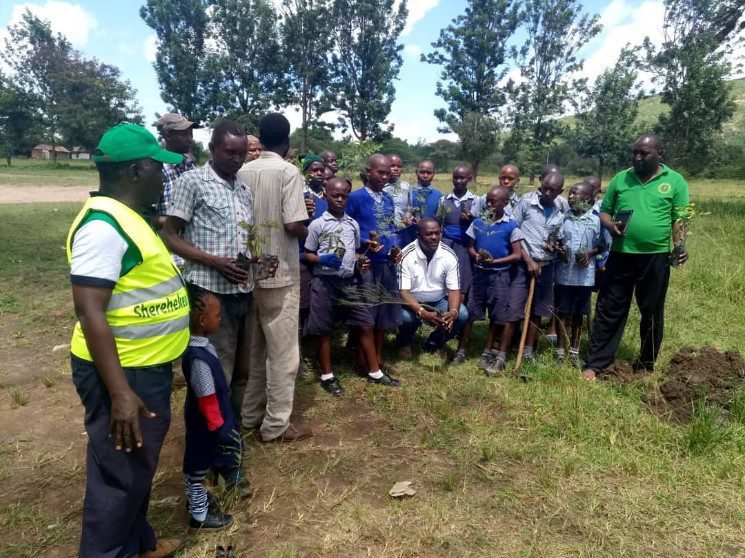
Strategies:
Pioneer Primary School Partners:
Emali
Iviani
Kaliini
Kalima
Kasuvi
Kathuma
Katisaa
Kiliku
Kitandi
Kiuwani
KwaKakeli
KwaKakulu
Masue
Matiku
Mbeletu
Mbuthani
Mulala
Mutyambua
Mwasangombe
Nduundune
Ndwaani
Ngelenge
Ngoto
Tutini
Uthangathi.
EGI Environment Club Membership
Membership to EGI School based Environment Clubs is open to students in any of the EGI school partners.
- A student becomes a member by registration, attending meetings and or events.
- Students must be in good academic standing.
- Students must understand the goals and values of Eco Green Initiative.
A member is subject to removal if he/she violates and/or contradicts school and Club policy.
Roles and responsibilities of EGI E-Club members
Management Committees
The EGI School based Environment Clubs Management Committee is responsible for the day-to-day running of the Club. It comprises leadership officials elected from and by Club members (Chair, Secretary and Treasurer)
Specific activities include:
EGI Environment Club Master/Mistress
An EGI E-Club Master/Mistress is the focal person for the Club in the school or community. Responsibilities include:
- Provide guidance and leadership to members
- Management, monitoring and evaluation of club activities and events
- Assist EGI Secretariat in identification, development and actualization of Club activities and events
- Sensitization on the rationale of EGI programs and common activities of Environment Clubs
- Facilitation of the development and implementation of work plans
- Ensuring Management Committees elections are held on time
- Reporting to the school/community and EGI Secretariat on Club activities
- Capacity building and Fundraising
- Keep records, submit reports, notify financial issues, prepare and present budget/allocation requests to Patron/EGI Secretariat
- Primary link between EGI E-Club and host school community
EGI Environment Club Patron
- Provide guidance, advise, supervision and motivation to Club Master/Mistress and Members
- Coordinates campaigns and advertises for the Club.
- Identifies and coordinates sponsorship for material, financial and related support toward EGI E-Club activities.
- Link between School administration, community and EGI Secretariat
Functions of EGI Secretariat
Working with children and clubs is an important part of the EGI. EGI Secretariat is responsible for:
Establishment and promotion of EGI E- clubs
Planning, formulation, supervision, implementation and monitoring of EGI E-Club programmes and policies
Provides a platform for sharing of information and experience between Clubs and community.
Networking of clubs at the local, regional, national and international level.
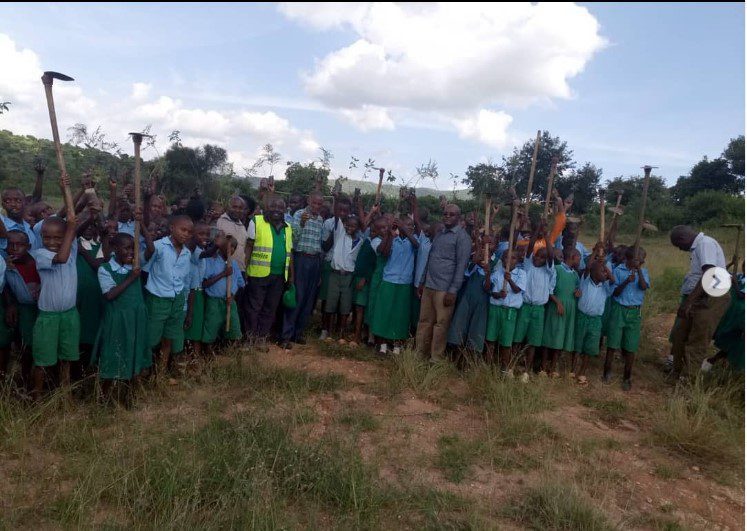
EGI Environment Club Masters and Patrons
| School | Club Master | Head Teacher | Patron | |
| 1 | Emali | James Mbaluka | ||
| 2 | Iviani | Mr Mutune | Ben Nziu | |
| 3 | Kaliini | Scholastica Ndambuki | ||
| 4 | Kalima | Gerald Kilei | ||
| 5 | Kasuvi | Kithome Kimondiu | ||
| 6 | Kathuma | Paul Kutenga | Peter Mukote | Tom Muteti |
| 7 | Katisaa | Mr Nguni | Jennifer Mwikali Sila | |
| 8 | Kiliku | Anthony Mukula | ||
| 9 | Kitandi | Mambo Mbai | ||
| 10 | Kiuwani | Mrs Patrick | Jacinta Kimatu | |
| 11 | Kwakakulu | Winfred Masai | Titus Mbatha | |
| 12 | Kwakaleli | |||
| 13 | Masue | Peter Kalani | ||
| 14 | Matiku | Charles Tuta | Mr Mwenze | Moses Kivungi |
| 15 | Mbeletu | Jacinta Ndambuki | ||
| 16 | Mbuthani | Fredrick Nzuvi | ||
| 17 | Mulala | Mr Mulandi | Lillian Shumilla | |
| 18 | Mutyambua | |||
| 19 | Mwasangombe | Bratrice Masai | Richard Wambua | Julius Kavita |
| 20 | Nduundune | Mr Pascal Mutunga | Richard Kiundi | |
| 21 | Ndwaani | Mr Njulu | Suzzanne Kamola | |
| 22 | Ngelenge | Mr Mulonzi | Dennis Mulwa | |
| 23 | Ngoto | |||
| 24 | Tutini | Athanus Kyalo Muange | ||
| 25 | Uthangathi | Jelvas Musau |
Club Activities
EGI E-Club activities are designed to achieve specific goals and objectives such as increasing knowledge on the environment; improving skills; examining values and attitudes.
- Activities are grouped into three categories:
- fieldwork and conservation
- awareness
- recreational education.
Awareness
These activities usually include the following:
- Creation of environment management awareness in schools, and among pupils and communities
- Participation in awareness events such as World Environment Day, World Wetlands Day, and other environmental days and events;
- Production and dissemination of Environmental Education (EE) materials
- In-service training in EE for teachers and training in biodiversity conservation for Club members
- Sensitization of communities on environmental conservation through the development of Website and Social Media content, Mobile App, Radio and TV discussion programs, meetings, conferences/seminars/forums, exchange visits, and the production and distribution of environmental Magazine/Newsletter
Fieldwork and Conservation
Field activities include:
- Establishment of tree nurseries and raising of seedlings
- Management of allocated tree growing areas at Hills (Muuni, Masue, Maatha and KwaKamba) riverine environments and other public spaces.
- Growing trees, habitat restoration and reforestation
- Protection of traditional medicinal plants
- Hygiene and sanitation (e.g., keeping the school premises clean/garbage collection)
- Biodiversity monitoring (nature expeditions during which information on species and habitat conditions is collected
Recreational Education
Activities under this category include:
- Inter Club competitions on topics that show local relationship between environment conservation and livelihood.
- Species identification
- Dramatized plays, debates, essays and poems.
- Educational trips, study tours, nature walks, excursions and camping.
Achievements
Increase in the level of community environmental awareness
Establishment of 20 EGI E-Clubs TV/Radio discussion
Establishment of nurseries
Planting and growing trees at Muuni
produce an average of 2000 plants per year
Practice of sustainable natural resource exploitation
Improvement of school yard greenery
Improvement in the participation of communities in rehabilitation of degraded land and biodiversity
Conservation of habitat
Link between EGI E-Clubs and Kenya’s Competence Based Curriculum (CBC)
The following chart provides examples on approaches EGI E-Clubs are expected to complement the teaching of Competence Based Curriculum (CBC). The chart is adopted from BirdLife International (2011) Guidelines for the Establishment, Development and Management of Wildlife Clubs in Africa. Nairobi, Kenya: BirdLife International Africa Partnership Secretariat. Website: www.birdlife.org/regional/africa
| Activity | Description | Skills development |
| Demonstrations | Activity to be conducted in front of a group for them to be able to repeat | Observation, participation |
| Investigations and Involvement | Members to conduct investigation into various environmental issues | Critical thinking, collection of data, analysis of data |
| Role plays | Assign roles of persons, animals or plants to members and let them act as if they have been affected by an imaginary environmental issue, and feel the way that thing is affected by them | Creativity |
| Guided imagery | Members close their eyes; a story is read aloud about an environmental issue to them and they pretend they are experiencing it | Concentration |
| Writing | Give members a list of specific topics and ask members to research and write a story about selected topics | Writing, investigating, researching, reporting |
| Case Study | Develop case studies by writing reports about events that have occurred; members read case study while a leader outlines the environmental issues, considering both successes and failures | Evaluation, analysis, decision-making |
| Moral dilemmas | Discuss moral conflict situations and present situations to members to discuss solutions | Values clarification, problem solving, decision making |
| Music/Drama/ Dance | Present environmental situations to members, create solutions and develop opinions about different topics; prepare members to present these situations at town meetings, etc | Creativity, performing, singing, dancing, public speaking, writing, presentations |
| Field trips | Identify topics and relevant sites to visit where they can obtain more information e.g., forest, national park | Observation, data collection, analysis |
| Debates | Identify an environmental issue, divide members into two groups and allow each group to choose a side of the issue; guide them to research their side of the issue in depth; conduct a debate that gives members opportunity to present their side of the argument | Research, writing, public speaking, debating |
| Surveys | Identify issues, write questionnaire and give members orientation on collection of data using questionnaire; help members to collect, analyse and present data | Data collection, analysis |
MONITORING AND EVALUATION
Monitoring and evaluation form a key part of the operations of EGI E-Clubs. Every EGI E-Club activity needs to be monitored and evaluated by EGI Secretariat. It is important to carry out frequent monitoring and evaluation of the operations of clubs to identify and address problems very early – before they become serious – and also to ascertain how the clubs are performing.
Methods used for monitoring and evaluation can include:
Assessment of the organisation of programs and events to identify challenges and needs and put in place plans to address them.
Reader surveys to assess the effectiveness of the various reading materials or environmental resource materials produced.
Meetings on lessons learnt and to share experiences and examine the way forward with a club and its activities.
Reports produced by focal persons at quarterly intervals on progress, financial situation and future plans of the club.
Monitoring academic performance of individual club members to establish a correlation between integrating Environmental Education into the national CBC, and academic work.
EGI Environment Clubs
Plant a Tree for the Future, Green Forever.
EGI is proud to be associated with:
Government of Makueni County, Lukenya University, SHULLET Agencies, Tana and Athi Development Authority (TARDA), EVERGREEN Horticulture East Africa, Ministry of Environment and Natural Resources, Kenya Forest Service, NACADA, Riccatti Business College, ENE FM.

